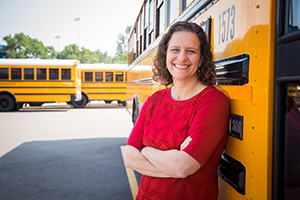 Most parents of teenagers know how difficult it can be to get their adolescents up early for school. While many may blame it on rebellious teen behavior, the problem is more likely their biology.
Most parents of teenagers know how difficult it can be to get their adolescents up early for school. While many may blame it on rebellious teen behavior, the problem is more likely their biology.
“We know that biological changes to circadian rhythms during puberty prevent middle and high school students from falling asleep early,” said Lisa Meltzer, PhD, sleep psychologist with National Jewish Health for Kids. “As a result, they hate to get up early.”
More and more middle and high schools are starting school later in the morning, spurred on by research from Dr. Meltzer and others. Dr. Meltzer has been a leading voice for delaying start times for middle and high schools. She has worked and consulted with school systems around Denver and the nation on aligning school start times more closely with adolescent biology.
Dr. Meltzer partnered with the Cherry Creek School District, near Denver, to study outcomes after the district pushed start times for high school and middle school students back roughly an hour. Her initial findings show that the number of students getting eight hours of sleep a night more than doubled, from 27 percent to 58 percent.
Dr. Meltzer will continue to study the impacts of the later start times to see if they affect student achievement, behavior and general health.